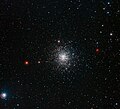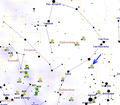M107 (球狀星團)
外观
| M107 | |
|---|---|
 來自哈伯太空望遠鏡的M107影像,視場3.5’。 | |
| 觀測數據(J2000 曆元) | |
| 分類 | X[1] |
| 星座 | 蛇夫座 |
| 赤經 | 16h 32m 31.86s[2] |
| 赤緯 | –13° 03′ 13.6″[2] |
| 距離 | 20.9 kly(6.4 kpc)[3] |
| 視星等(V) | 7.9[4] |
| 視直徑(V) | 10′[5] |
| 物理性質 | |
| Mass | 1.82×105[3] M☉ |
| 半徑 | 30 ly[6] |
| 金屬量 | –0.95[7] dex |
| 估計年齡 | 139.5億年[7] |
| 其它名稱 | C 1629-129, GCl 44, M 107, NGC 6171[8] |
M107或梅西耶107,也稱為NGC 6171或十字架星簇,是個結構非常鬆散的球狀星團。它位於蛇夫座,在南天球的中段,靠近的赤道],並且是梅西耶星表中的最後一個此類天體。
觀測歷史、命名和指南
[编辑]它於1782年4月由皮埃爾·梅尚發現,然後在1793年由威廉·赫歇爾再度獨立發現。赫歇爾的兒子約翰在他1864年的《總星表》中,將其描述為「一個巨大而豐富的球狀星團,非常壓縮,圓形,解析度高,顯然是由恆星組成」[5]。直到1947年,海倫·索耶·霍格才將它和梅尚發現的另外三個天體添加到現代星表中。梅尚貢獻了幾個建議的觀測天體,梅西耶經由驗證並添加了這些天體[9]。這個星團位於恆星天市右垣十一(韓,蛇夫座ζ)以南2.5°並稍偏西的地方[5]。
性質
[编辑]M107靠近銀河平面,距離地球大約20,900光年[3],距離銀河中心 9,800 ly(3,000 pc)[10]。它的軌道部分深入銀暈,與銀河中心的距離在9,200—12,400 ly(2,820—3,790 pc)之間,下標數位是「銀河系中心的距離」,可以看到它進入和離開星系棒[11]。
它是奧斯特霍夫I型[12]星團,金屬量為 -0.95[7][a],它並且它符合大部分暈族群[10]。已知這個星團中有22顆天琴座RR型變星,還有一顆可能的鳳凰座SX型變星[13]。
圖集
[编辑]-
球狀星團 Messier 107 圖像由在MPG/ESO 2.2米望遠鏡上的廣視場成像儀(WFI)拍攝的球狀星團M107圖像。
-
標示M107位置的星圖。
相關條目
[编辑]參考資料和註腳
[编辑]- ^ Shapley, Harlow; Sawyer, Helen B., A Classification of Globular Clusters, Harvard College Observatory Bulletin, August 1927, 849 (849): 11–14, Bibcode:1927BHarO.849...11S.
- ^ 2.0 2.1 Goldsbury, Ryan; et al, The ACS Survey of Galactic Globular Clusters. X. New Determinations of Centers for 65 Clusters, The Astronomical Journal, December 2010, 140 (6): 1830–1837, Bibcode:2010AJ....140.1830G, S2CID 119183070, arXiv:1008.2755
 , doi:10.1088/0004-6256/140/6/1830.
, doi:10.1088/0004-6256/140/6/1830.
- ^ 3.0 3.1 3.2 Boyles, J.; et al, Young Radio Pulsars in Galactic Globular Clusters, The Astrophysical Journal, November 2011, 742 (1): 51, Bibcode:2011ApJ...742...51B, S2CID 118649860, arXiv:1108.4402
 , doi:10.1088/0004-637X/742/1/51.
, doi:10.1088/0004-637X/742/1/51.
- ^ Messier 107. SEDS Messier Catalog. [30 April 2022].
- ^ 5.0 5.1 5.2 Mullaney, James, The Herschel Objects and How to Observe Them, Astronomers' Observing Guides, Springer Science & Business Media: 94, 2007, Bibcode:2007hoho.book.....M, ISBN 978-0387681252.
- ^ 使用三角學測量:半徑 = 距離 × sin( 角直徑/ 2 ) = 39.5 ly。
- ^ 7.0 7.1 7.2 Forbes, Duncan A.; Bridges, Terry, Accreted versus in situ Milky Way globular clusters, Monthly Notices of the Royal Astronomical Society, May 2010, 404 (3): 1203–1214, Bibcode:2010MNRAS.404.1203F, S2CID 51825384, arXiv:1001.4289
 , doi:10.1111/j.1365-2966.2010.16373.x
, doi:10.1111/j.1365-2966.2010.16373.x  .
.
- ^ NGC 6171. SIMBAD. 斯特拉斯堡天文資料中心.
- ^ Frommert, Hartmut; Kronberg, Christine, Messier 107, SEDS Messier pages (Students for the Exploration and Development of Space (SEDS)), August 30, 2007 [2018-12-07].
- ^ 10.0 10.1 Zinn, R., The globular cluster system of the galaxy. IV - The halo and disk subsystems, Astrophysical Journal, Part 1, June 15, 1985, 293: 424–444, Bibcode:1985ApJ...293..424Z, doi:10.1086/163249.
- ^ Pichardo, Bárbara; et al, Models for the Gravitational Field of the Galactic Bar: An Application to Stellar Orbits in the Galactic Plane and Orbits of Some Globular Clusters, The Astrophysical Journal, July 2004, 609 (1): 144–165, Bibcode:2004ApJ...609..144P, S2CID 16356464, arXiv:astro-ph/0402340
 , doi:10.1086/421008.
, doi:10.1086/421008.
- ^ Olech, A.; et al, The Clusters AgeS Experiment (CASE): RR Lyrae variables in the globular cluster NGC 6362, Monthly Notices of the Royal Astronomical Society, March 2001, 321 (3): 421–432, Bibcode:2001MNRAS.321..421O, S2CID 14453719, arXiv:astro-ph/0005589
 , doi:10.1046/j.1365-8711.2001.04010.x
, doi:10.1046/j.1365-8711.2001.04010.x  .
.
- ^ McCombs, Thayne; et al, Variable Stars in the Globular Cluster M107: The Discovery of a Probable SX Phoenicis, AAS Meeting #221 221, American Astronomical Society: 250.22, January 2013, Bibcode:2013AAS...22125022M, 250.22.
- ^ Where minus 1 would be 10 times less iron-to-hydrogen metallicity than the Sun
外部連結
[编辑]- SEDS: Globular Cluster M107
- Messier 107, Galactic Globular Clusters Database page
- WikiSky上关于M107 (球狀星團)的内容:DSS2, SDSS, GALEX, IRAS, 氢α, X射线, 天文照片, 天图, 文章和图片


